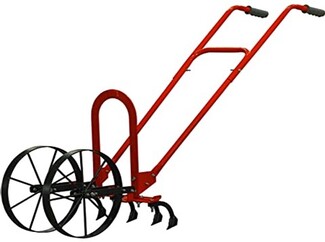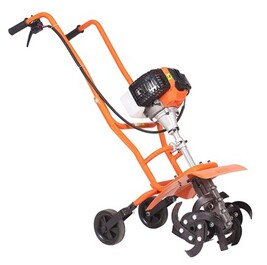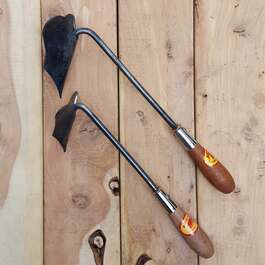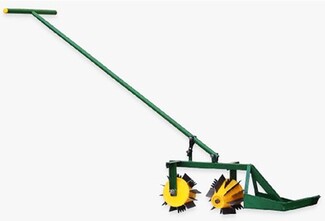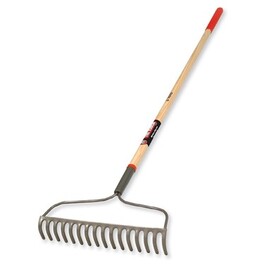TILLING
MAINTENANCE
The tool needs to be cleaned after use, removing soil attached to the sharp end of the tool. It should be stored in a dry place to avoid any kind of rusting. Oiling of the wheels will increase both the efficiency of the tool and its lifespan. Repainting the tool whenever necessary will also ensure long life of the tool.
UTILITY
It helps to maintain overall fertility of the field. The sharp end of the tool in addition to weeding helps in tilling of the soil.
APPLICATION
Mostly used in fields where cauliflower, broccoli, potatoes, cabbage are grown. Weeds that have roots grown to the depth of 10-20 cm can be easily removed with the double wheel hoe.
COST/UNIT (India)
INR 2000 -5000
COST/UNIT (Bangladesh)
BDT 3000 -5000
DURABILITY
Made up of mild steel, it is very robust and stable when in use.
ESTIMATED CAPACITY
It has a weight of around 4.5 kg and a capacity upto 150m2 / hr
SOCIO ECONOMIC BENEFIT
It avoids bending/squatting postures. The productivity of a worker is increased more than three times. It saves 59% labour and operating time. It results in about 43% saving in cardiac cost of workers per unit of output.
SUBSIDIES/ASSISTANCE FROM GOVT. (India)
INR 8000-10000 under SMAM( Sub mission on agriculture mechanization) scheme.
SUBSIDIES/ASSISTANCE FROM GOVT. (Bangladesh)
N/A
AGENCIES INVOLVED (India)
Department of Agriculture, Cooperation & Farmers Welfare (DAC&FW);Ministery of Agriculture and Farmers Welfare Government of India; Government of Jharkhand, Sakhi Mandal; CIAE, Nabi Bagh, Berasia Road, Bhopal.
AGENCIES INVOLVED (Bangladesh)
Bangladesh Agri Research Institutes, BRRI
MAINTENANCE
The machine needs to be cleaned after use and all the extensions of the machine need to be removed after use. Regular oiling is also necessary to maintain the machine and it is advised not to use the tiller on hard terrains. Overheating the engine also reduces its efficiency and it is advised to turn off the machine when it has overheated.
UTILITY
This advanced machine with provision for attachment of other tools is capable of weeding, tilling, aerating and preparing the land for cultivation.
APPLICATION
It is ideally suited for softer terrains and not hilly harsh terrains. They are ideal for small plots that grow seasonal vegetables, paddy, wheat and maize.
COST/UNIT (India)
INR 10,000-20,000
COST/UNIT (Bangladesh)
BDT. 5,000 – 30,000
DURABILITY
The metal body offers rigidity and stability, and eliminates severe vibration in the machine.
ESTIMATED CAPACITY
Ploughing and rotovating with effective field capacity of 0.012ha/hr and 0.015ha/hr
SOCIO ECONOMIC BENEFIT
It is for mechanical control of weeds in crops such as tapioca, cotton, sugarcane, maize, tomato and pulses whose rows spacing is more than 450 rpm. The lightweight power tiller can also be used for tillage under hill agriculture and terrace farming. It helps in avoiding the difficult task for women having to bend for prolonged hours in order to clean the fields. Therefore, it mitigates the risk of back pain, musculoskeletal complications in women and promotes a quality work life.
SUBSIDIES/ASSISTANCE FROM GOVT. (India)
INR 60000-75000 under SMAM( Sub mission on agriculture mechanization) scheme.
SUBSIDIES/ASSISTANCE FROM GOVT. (Bangladesh)
N/A
AGENCIES INVOLVED (India)
Department of Agriculture, Cooperation & Farmers Welfare (DAC&FW); Ministery of Agriculture and Farmers Welfare Government of India; Government of Jharkhand, Sakhi Mandal; CIAE Bhopal
AGENCIES INVOLVED (Bangladesh)
Bangladesh Agri Research Institutes, Bangladesh Agricultural university
MAINTENANCE
The tool needs to be cleaned after use and needs to be kept in a moisture free place to avoid rusting. Repainting the tool whenever the paint has peeled off will ensure longer life of the tool.
UTILITY
It is ideal for making ridges and furrows in the field. Furrows (Nalis) are little channels that facilitate the flow of water in the field.
APPLICATION
This tool suits smaller plots where seasonal vegetables are grown. It also suits small terrace farms where it is necessary to retain water in paddy, maize and wheat plots.
COST/UNIT (India)
INR 700
COST/UNIT (Bangladesh)
BDT 1000-2000
DURABILITY
It is made from mild steel, which makes the tool sturdy, offers resistance against wear & tear, and has excellent efficiency
ESTIMATED CAPACITY
Worker productivity is almost doubled with the use of hand ridger compared to traditional practices. A capacity of upto 330m2 is achievable.
SOCIO ECONOMIC BENEFIT
It avoids the bending posture, which is generally adopted in traditional method with short handled tools for making ridges. It results in about 67% saving in cardiac cost of worker per unit output with the ridger compared to the traditional method of making ridges.
SUBSIDIES/ASSISTANCE FROM GOVT. (India)
INR 1500-1900 under SMAM( Sub mission on agriculture mechanization) scheme.
SUBSIDIES/ASSISTANCE FROM GOVT. (Bangladesh)
50% up to 0.4 lakh
AGENCIES INVOLVED (India)
Department of Agriculture, Cooperation & Farmers Welfare (DAC&FW); Ministery of Agriculture and Farmers Welfare Government of India; Government of Jharkhand, Sakhi Mandal; CIAE, Nabi Bagh, Berasia Road, Bhopal.
AGENCIES INVOLVED (Bangladesh)
Bangladesh Agri Research Institutes, Bangladesh Agricultural university
MAINTENANCE
The tool needs to be cleaned after use, removing dried soil that is attached to the spikes of the cono weeder. The tool needs to be kept in a rust free and moisture-free environment. Regular oiling of the turning element of the tool is also necessary to experience full efficiency of the tool.
UTILITY
It is used to remove unwanted plants. The sharp teeth at the end of the tool penetrate deep into the soil and dig out the unwanted plants and their roots to prevent the growth of unwanted plants.
APPLICATION
The tool serves a wide variety of fields including paddy, wheat and maize where the water content of the soil is high.
COST/UNIT (India)
INR 1900
COST/UNIT (Bangladesh)
BDT 3200
DURABILITY
Carved out of mild steel, the tool is sturdy and comes with a good lifespan.
ESTIMATED CAPACITY
It has a weight of 8.5 kg and capacity of 120 m2/hr
SOCIO ECONOMIC BENEFIT
Requiring minimal push action while standing, the tool helps in avoiding bending for prolonged hours which would have otherwise resulted in knee pain and other musculoskeletal complications in the later part of the farmers life.
SUBSIDIES/ASSISTANCE FROM GOVT. (India)
INR 500-600 under SMAM( Sub mission on agriculture mechanization) scheme.
SUBSIDIES/ASSISTANCE FROM GOVT. (Bangladesh)
50% up to 1200
AGENCIES INVOLVED (India)
Department of Agriculture, Cooperation & Farmers Welfare (DAC&FW); Ministery of Agriculture and Farmers Welfare Government of India; Government of Jharkhand, Sakhi Mandal; Department of Farm Machinery, Agricultural Engineering College & Research Institute, TNAU, Coimbatore
AGENCIES INVOLVED (Bangladesh)
Bangladesh Agri Research Institutes, Bangladesh Agricultural university
MAINTENANCE
Cleaning of the tool after use increases its lifespan. The tool must be kept in a place where moisture content is low to prevent rusting.
UTILITY
It facilitates loosening of the soil which improves aeration and plant growth. It is also commonly used for weeding purposes.
APPLICATION
It is most suitable for horticulture, i.e. in small plots where tomatoes, potatoes, cauliflower, turnip are grown.
COST/UNIT (India)
INR 300-1200
COST/UNIT (Bangladesh)
BDT 1700
DURABILITY
The material used for the construct is either mild steel or Aluminium, therefore the tool is rigid and robust. The use of Aluminium also prevents rusting.
ESTIMATED CAPACITY
Higher productivity than the primitive way of cleaning the plot by hand or by age old tools.
SOCIO ECONOMIC BENEFIT
It avoids the bending posture, which induces back pain whilst cleaning of the plot. It also considerably increases efficiency and quality of life.
SUBSIDIES/ASSISTANCE FROM GOVT. (India)
INR 1500-1900 under SMAM( Sub mission on agriculture mechanization) scheme.
SUBSIDIES/ASSISTANCE FROM GOVT. (Bangladesh)
50% up to 1200
AGENCIES INVOLVED (India)
"Department of Agriculture, Cooperation & Farmers Welfare (DAC&FW); Ministery of Agriculture and Farmers Welfare; Government of India, Government of Jharkhand; Sakhi Mandal"
AGENCIES INVOLVED (Bangladesh)
Bangladesh Agri Research Institutes, Bangladesh Agricultural university
